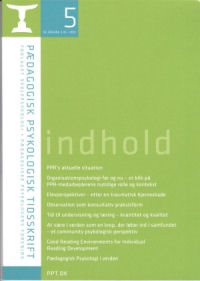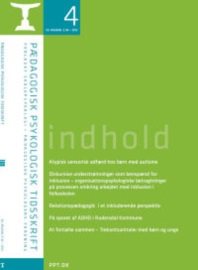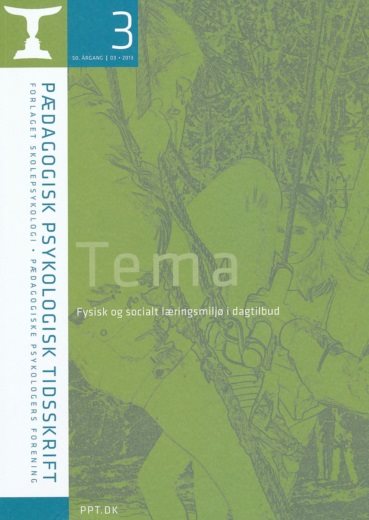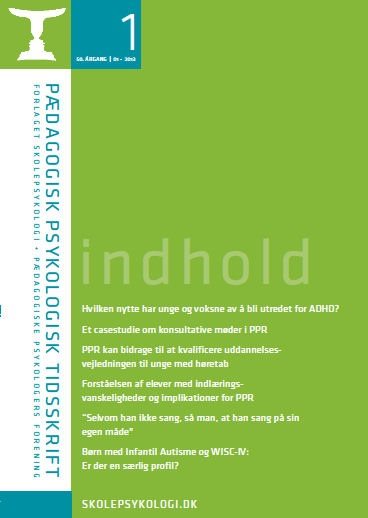Beskrivelse
Nielsen, Bjarne (Chairman of the Association of Danish Educational Psychologists).
The Present Situation of Educational Psychology. Pædagogisk Psykologisk
Tidsskrift, 2013, Vol. 50, 5, 3-7. – The implications for educational psychology of the
implementation of a new law, demanding more inclusion of children with problems
and handicaps are discussed. One main problem is that the focus of all parts is on
inclusion. This diminishes the many other tasks of e.p.s such as: developing normal
education, helping teachers to develop teaching competences, participating in work
with children below school age, assisting parents in need of counseling etc. The association
of educational psychologists is about to publish a new handbook of e.p. in
the municipalities. – Bjørn Glæsel
Holm; Lone Willer (Psychologist, specialist of work related and organizational psychology).
Organizational Psychology Then and Now – A Look at the Role
and the Context of the Educational Psychologist. Pædagogisk Psykologisk
Tidsskrift 2013, Vol. 50, 5, 8-18. One possible impact of the educational psychologists’
altered job content is the fact that the field of organisational psychology will
constitute a bigger part of educational psychologists’ work area in the future. The
purpose of this article is, by the use of four overall perspectives on organisational
life, to define a framework, within which the development of many theories and models
about organisational life – including individuals, groups and organisations –
can be adapted. It presents several examples of how educational psychologists’
practice is affected by the four perspectives on organisational life and it argues that
the simultaneous existence of the four perspectives leads to a high degree of complexity
in the assignments of educational psychologists. Finally, it concretises some
recommendations for educational psychologists that aim at strengthening their professional
knowledge related to their work on organisational issues in the future. –
Lone Willer Holm
Killi; Eli Marie (Ph.d.advisor at Statped Sørøst, Norway). Pupil Perspectives after
Traumatic Brain Injury. Pædagogisk Psykologisk Tidsskrift, 2013, Vol. 50, 5,
19-35. – This article explores pupils’ perspectives after traumatic brain injury.
Traumatic brain injury (TBI) caused by trauma to the head, which can result from
traffic accidents, falls, sporting accidents or violence, is one of the most frequent
causes of acquired disability in children and adolescents. The theoretical framework
relies on perspectives from both neuropsychology, from the external standpoint,
and critical psychology, from the standpoint of the subject. This presentstudy shows that pupils with TBI differ from each other like other pupils do. Their
action reasons should be understood both as a result of their TBI per se, but also in
response to their experiences after TBI. The pupils’ perspectives were neither sufficiently
emphasized nor understood, and this seemed largely to be the result of the
teachers’ lack of awareness, knowledge and understanding of “brain injury in practice.”
– Eli Marie Killi
Højholt, Charlotte & Szulevicz, Thomas (Ph.D, Associate Professor, Department of
Psychology and Educational Studies, Roskilde University and Ph.D, Assistant Professor,
Department of Communication and Psychology, Aalborg University). Observation
as Consultative Practice. Pædagogisk Psykologisk Tidsskrift, 2013, Vol.
50, 5, 36-47. – What are the potentials and the demands of observation of educational
psychologists? There is a need to develop concepts underlying the observation
of social exchange and its consequences for those involved – in practice and in research.
Unsystematic reports that do not look at the connections and understanding
are hardly legitimate. If psychologists appreciate such connections it might inspire
teachers to make their own observations and explore the everyday life of the
children – thereby enhancing their development. – Bjørn Glæsel
Egelund, Niels (Professor, director of the Center for Strategic Research of Education,
the University of Aarhus). Time for Teaching and Learning. Pædagogisk
Psykologisk Tidsskrift, 2013, Vol. 50, 5, 48 – 54. – Amount of time in school for different
subjects is primarily based on traditions and experience. Number of subjects
to have increased over time and politicians and school administrators face the question
of the minimal and optimal number of hours per subject per school year. While
there is a wealth of knowledge about the influence of class size there is less knowledge
about the influence from time. The Danish Parliament has decided that the
school day should be longer, and Denmark is below the OECD average. The Danish
Teachers Union is against a longer school day and refers to the latest IEA-studies
where there are no clear relations between school hours and student proficiency.
Looking at international research it becomes clear that time is composed of several
elements, available time, allocated time, engaged time and academic learning time.
Therefore teachers, headmasters and psychological counselors should focus on the
optimal use of time allocated and should bear in mind slow learning students are
the ones to pay the price for few lessons. – Niels Egelund
Berliner, Peter (Professor of Social Learning and Developmental Processes, the
University of Aarhus). To be in the World as a Body Running into Society – A
Community Psychological Perspective. Pædagogisk Psykologisk Tidsskrift,
2013, Vol. 50, 5, 55-65. – The article discusses three dimensions of learning as a
shared community activity. Firstly, it is argued that collective learning can change
the shared understanding of running as a physical activity. Running is both a symbolic
activity and a movement through a physical space. Secondly, it is shown that
a strong emphasis on talking rather than on doing may silence vulnerable young
people instead of opening spaces for expressions of opinions, visions and emotions.
Finally, it is argued that in a framework of community psychology learning should
be defined as any act that transforms the context or the perception of the context. –
Peter Berliner
Ivarsson, Lena & Boström, Lena (Lecturers at the University of Mid Sweden).
Good Reading Environments for Individual Reading Development. Pædagogisk
Psykologisk Tidsskrift, 2013, Vol. 50, 5, 66-80. – Which are the key-factors
that create good reading environments and maintain a sustainable reading interest
on an individual level? This paper is a conceptual paper in which a theoretical
framework built on international empirical research was identified, by connecting
and systematizing different parts of reading, learning and teaching. This area is
complex and complicated because it involves interactions and different learning and
teaching perspectives. In this paper we present research that finds that teaching
reading based on individual reading styles and strategies is an effective way to ensure
children’s achievement, interest, self-confidence, and motivation. Children’s
awareness of reading strategies supported by favorable reading environments influence
meta-cognition and also the ability and interest to become a skilled reader. It
is also clear that teachers’ pedagogical knowledge is of great importance as well as
their ability to use a variety of teaching strategies to meet the needs of every individual.
This paper provides useful information unraveling concepts, methods and
effects which can aid children, parents, teachers and researchers in understanding,
evaluating and monitoring reading, thus having practical implications for promoting
lifelong reading. – Lena Ivarsson og Lena Boström




